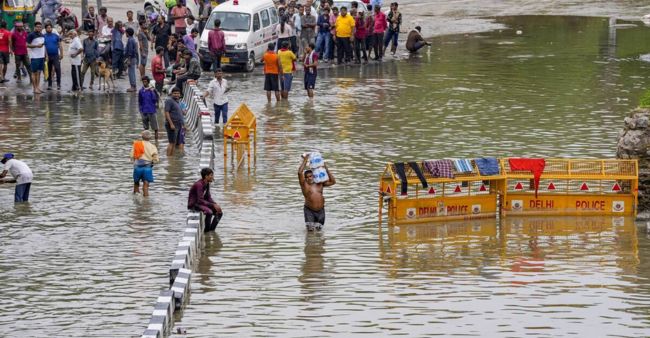Water-borne diseases are a major threat, says Dr Yudhyavir Singh, Assistant Professor at AIIMS, New Delhi.
New Delhi
It is a difficult time for the country because a large portion of north India is experiencing record-high rainfall and flooding which will bring its own pandemic.
“Pregnant women in the flooded area have a higher risk of miscarriage and pre-cum deliveries in the flooded region,” said Dr Yudhyavir Singh, Assistant Professor at AIIMS, New Delhi. Flooding and survival from it are something visible, but what about the invisible threat that this flood brings for us, which is the health-related issues?
Let’s understand the various aspects of the issue with Dr Yudhyavir Singh, Assistant Professor at AIIMS, New Delhi:
Disease
The major disease that comes along with this natural disaster is waterborne diseases, which are those that come from drinking or coming into contact with contaminated water. These can include diarrhoea, cholera, typhoid fever, jaundice, hepatitis A and E, and leptospirosis. It can also sometimes be vector-borne diseases, which come from an intermediate species carrying the disease pathogen, like a mosquito. Vector-borne diseases that come about from flooding include dengue fever, malaria, and typhoid. Some of these diseases are communicable diseases that need to better take care of.
Skin-related allergies and diseases are also very common in such areas.
Precautions
In floods, most of the time the quality of the water is compromised, so it’s better to drink boiled water, even if it comes from the filter or a water tanker. To protect against vector-borne disease, one needs to use a mosquito net.
Avoid getting in contact with floodwater. If there is a wound, then running water should be applied; the preferred combination will be lukewarm water and antiseptics.
Floodwater may contain sharp objects, such as glass or metal fragments, that can cause injury and lead to infection. So, the nearest doctor should be contacted.
In case of pregnancy
If a woman is pregnant, in such a situation there is a high chance of miscarriage, if it’s the third trimester then pre-cum delivery, and also it’s very hard to conceive.
Other threats and precautions
Snakebite and scorpion bites can be prevalent. So, adequate lighting and precautions should be taken.
Scorpion bites can lead to anaphylaxis; severe reactions can lead to shock, admission, and death as well. In both snakes and scorpions. If such a situation takes place, visit a nearby doctor, even if there is any suspicion.
Flood water also carries chemical quantities, depending on the area. Chemicals can also cause severe injuries, and diseases like Pneumonia, skin rashes, allergies, and skin diseases are also very prevalent. If we take the current situation as an example, Yamuna contains a huge amount of sulfur. So, sulfur causes eye irritation and nose irritation and can be allergic. If it enters the lungs, it can shock, and a huge quantity can cause a poisonous effect. It depends on the quantity and how much it can affect.

